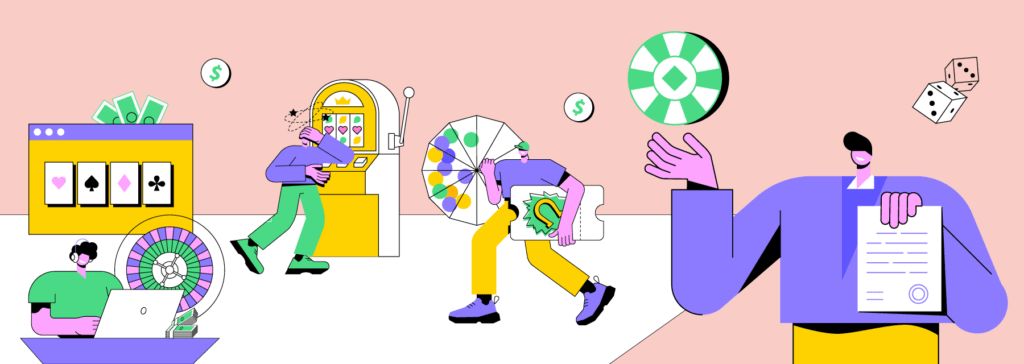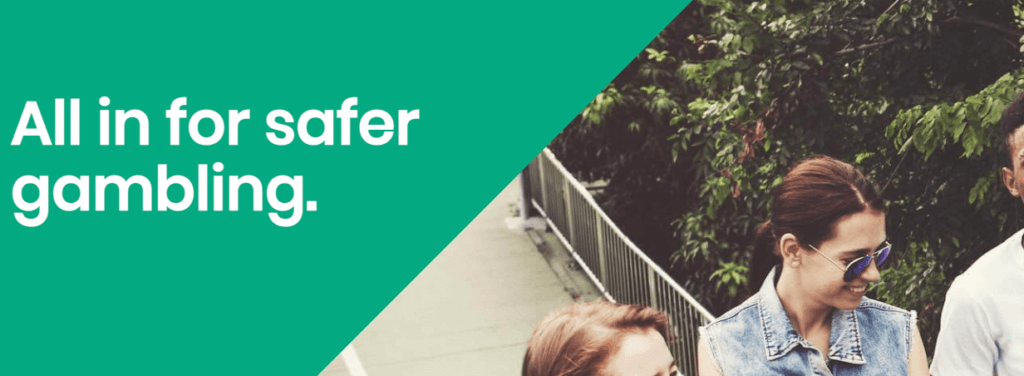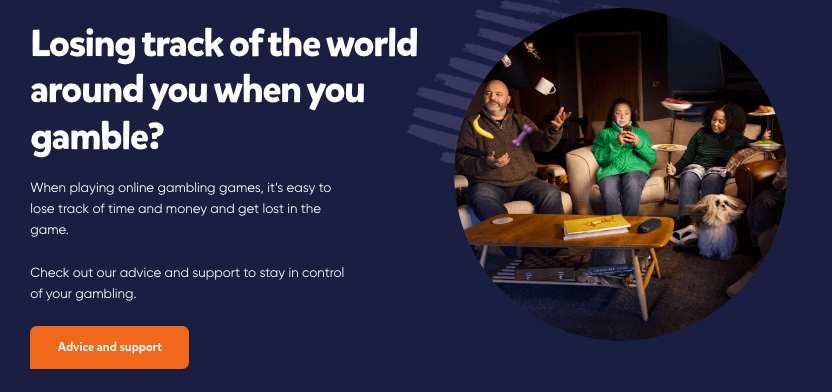In the contemporary landscape where gambling choices abound, Responsible Gambling is seen as a critical initiative.
Responsible Gambling is encapsulated in legislation that mandates online casinos in Canada to integrate protective measures into their platforms, safeguarding vulnerable players. This concept serves as a framework that shields users, ensuring a secure and enjoyable gaming experience with minimized risks.
In this piece, we're set to explore the extensive framework of Responsible Gambling . You'll learn how to assist a friend with a gambling addiction, recognize signs of personal gambling problems, and safeguard minors from potential risks.
We'll introduce you to tools offered by online casinos to help manage gambling behaviors, and point you towards Canadian organizations that offer support if you feel the need for assistance.

What is Responsible Gambling?
Responsible Gambling is a multifaceted concept, encompassing various policies and mandates for gambling entities. Its ultimate aim is to guarantee that the highest quality standards are upheld, providing players with a secure experience free from gambling's potential pitfalls.
The ethos of Responsible Gambling encourages players to view gambling primarily as entertainment, rather than a source of income. While many people gamble casually within their means, some let it dominate their lives, leading to addiction that adversely affects them and their loved ones.
Licensed online casino operators Game providers are mandated to implement Responsible Gambling principles throughout their operations. There are seven key sectors of Responsible Gambling closely tied to iGaming that form part of the regulatory framework:
- The protection of vulnerable players
- The exclusion of underage individuals from gambling activities
- Robust measures against illegal activities
- Protection for online payments
- A safe online environment
- Personal data privacy
- Responsible and ethical marketing
Each online gambling site must feature a specific section dedicated to Responsible Gambling. This section serves as a resource for anyone interested in learning about Responsible Gambling or concerned about potential gambling issues.
The content and resources provided in this section vary slightly by platform, but they generally offer guidance, tips, access to helpful tools, a self-evaluation quiz, and additional information.
Furthermore, tools designed to protect minors are showcased, illustrating how casinos employ Responsible Gambling in their operations. Importantly, the Responsible Gambling section directs players to professional organizations that specialize in addressing gambling addiction.
Are you worried you might have issues with gambling?
Consider these questions regarding your gambling habits. If you find yourself answering ‘yes’ to any of them, it’s advisable to connect with one of the specialized problem gambling counseling agencies listed below.
- Do you ever feel guilty about the amount of money you lose gambling?
- Does the thrill of gambling only come when you wager large sums?
- After experiencing a loss, is it tough for you to stop gambling?
- Is gambling impacting your or your family's financial stability?
- Has gambling negatively impacted your relationships, career, or education?
- Is your health, including stress or anxiety, being affected by gambling?
- Do you become restless when not gambling?
- Are you concerned that gambling might be a problem for you?
Assisting Someone Struggling with a Gambling Addiction
Are you worried that a loved one might have a gambling problem but you’re unsure of what signs to look for? Recognizing the red flags of problem gambling can lead to important decisions for obtaining help. The first indicators often manifest as shifts in financial habits, time management, mood, and behavior. We'll explore these warning signs to help you identify them in detail.
Financial signs
- Unexplained monetary discrepancies from accounts or wallets
- Missing valuable possessions or home items
- Consistently experiencing financial shortages despite earning a salary
- Having multiple loans
- Unpaid bills
- Borrowing money regularly
- Lack of food at home
- Secrecy about financial records
How time is spent
- Dedicating more and more time to gambling activities
- Arriving late for appointments
- Frequently taking unplanned leaves or calling in sick
- Simple tasks taking a very long time
- Unexplained absences and secrecy
Mood and Behavioural signs
- Work performance is affected
- Becoming withdrawn from loved ones
- Seeming constantly worried, upset, or agitated with no obvious cause
- Changes in personality
- Manipulative behaviour
- Manipulating others with deceit or ultimatums
- Expressing feelings of despair, depression, and dissatisfaction
While these indicators may aid in identifying a gambling problem, the secrecy surrounding such behaviors can make pinpointing the root cause challenging. Those involved may attempt to obscure or falsify their feelings or become defensive if questioned.
For friends or relatives observing these behaviors, it can be a hard truth to face that someone you care about could be dealing with a serious issue. The realization may bring about feelings of guilt for not recognizing the symptoms sooner, and you might feel anger or betrayal. These emotional responses are common during such situations, and balancing these emotions with an understanding of the gambler's situation can be difficult.
Gaining insight into what the gambler is dealing with can help you connect with them more effectively. Through mutual understanding, they might feel secure enough to share their struggles with you, enabling you both to work towards a resolution and seek professional assistance if needed.
Legal Gambling Age and Youth Protection Strategies
A key objective of Responsible Gambling involves shielding younger individuals from gambling exposure. Establishing a minimum legal gambling age is a straightforward and efficient method to prevent underage gambling. In Canada, provincial regulations dictate legal gambling ages, which differ by region. Typically, the age threshold is 19, though we've compiled a list per province to ensure our readers are fully informed.
| Province | Legal Gambling Age | Province | Legal Gambling Age |
|---|---|---|---|
| Ontario | 19 | Quebec | 18 |
| Newfoundland | 19 | New Brunswick | 19 |
| Nova Scotia | 19 | Manitoba | 18 |
| Prince Edward Island | 19 | Saskatchewan | 19 |
| Alberta | 18 | British Colombia | 19 |
| Yukon | 19 | Northern | 19 |
| Nunavut | 19 |
Online casino operators must uphold age verification procedures to confirm that underage users are not engaging in real money play. These measures may include electronic verification or requesting official documents like passports or identification cards.
It's not solely up to operators to assume responsibility. Individuals residing in households with minors should actively prevent any exposure to gambling content. Follow these safety tips to protect young ones from gambling-related material:
- Keep login credentials for gambling accounts secure
- Don’t save passwords on your computer
- Educate children about gambling's risks and legal age requirements
- Employ parental control tools on digital devices
- Install website blocking software
Such measures are particularly effective at preventing children and minors from accessing gambling sites or inadvertently encountering gambling ads. Solutions like Net Nanny, CYBERsitter, CYBER PATROL, GamBan, GamBlock, and BetFilter can be instrumental in achieving this.
Responsible Gambling Tools
An essential requirement for Responsible Gambling is the implementation of effective mechanisms by online casinos. These tools form part of the player account and may help in managing gambling habits and tracking betting activities. Let's explore the available tools, their functions, and benefits.
Deposit Limit
As the tool name implies, it enforces a cap on how much money you can deposit over daily, weekly, or monthly periods. Once the established limit is hit, adding more funds to your account is paused until a new period begins, effectively mitigating potential over-spending issues.
Loss Limit
This tool doesn't restrict deposits but rather imposes limits on potential losses within a day, week, or month. Once the specified loss threshold is exceeded, you'll be prevented from placing further bets—a useful feature to minimize financial risk if gambling outpaces your budget.
Session Limit
Should you find yourself dedicating excessive time to gambling, this tool could prove invaluable. Accounting for playtime, it provides a clearer picture of hours spent gambling and flags when activity exceeds a healthy pastime duration. It automatically logs users out after a set gaming duration, offering healthy reminders.
Wagering Limit
For those concerned about betting limits, the wagering restriction tool is helpful. Whether per session, daily, weekly, or monthly, it sets boundaries for betting amounts to ensure you don't stake more than sensible limits.
Transaction History
Offering a comprehensive overview, this tool displays all financial movements within your account, including deposits, withdrawals, placed bets, outcomes, and pending wagers. It's suggested that players use this feature to remain informed of their gambling activity and to avoid getting swept away by the thrill.
Self Exclusion
Gamblers are advised to step back and take a breather if they feel their gaming habits are spiraling. The Self-Exclusion feature is at your disposal to freeze your account whenever you need to. During this period, access to your account is barred, preventing any gaming on that particular platform.
You can often opt for self-exclusion spans ranging from a day to a week, six months, or indefinitely. Choosing the indefinite option means the platform will no longer allow you to engage in gambling activities.
Self-Assessment
The Self-Assessment feature provides a questionnaire that asks players to reflect on different aspects of their gambling habits. Upon completion, players receive feedback highlighting areas negatively impacted by gambling, along with suggestions for tools to help improve those areas.
Time Alert
Think of the Time Alert as a friend's gentle prod, reminding you how long you've been gaming. It offers a glimpse into your balance shifts, aiding players in making well-informed decisions about continuing their sessions.
Counseling and support organizations are available.
Nowadays, players in Canada have ample resources if they grapple with gambling issues. Numerous organizations are focused on advocating Responsible Gambling and mitigating the adverse effects of gambling problems. Here, you'll find a list of these organizations, complete with websites and contact information. They're dedicated to providing insights on gambling addiction and assisting those seeking to overcome their challenges. Services range from personal counseling, support for family and friends, financial advice, self-help groups, and discussion forums. Professionals are on hand, ready to support you and your loved ones through these tough times.
Responsible Gambling Council (RGC)
The Responsible Gambling Council (RGC) is a pivotal non-profit entity leading efforts in curbing gambling issues in Canada for over 35 years. Their mission is to ensure protective measures for gambling are upheld, benefiting individuals and the broader community.

Website – www.responsiblegambling.org
- The Canada Safety Council is a stand-alone charitable group dedicated entirely to safety advocacy. They serve as national experts in spreading knowledge and providing resources. Among their endeavors is a program addressing gambling addiction, integral to their broader community safety initiatives, designed to help Canadians live safer, healthier lives. Contact the Canada Safety Council here:
- Phone – +1 (416) 499-9800
Canada Safety Council
CAMH stands tall as Canada’s prime mental health teaching institution, setting benchmarks in care, education, and research, while also paving the way for societal shifts. Beyond mental health, CAMH combats all sorts of addictions, including those linked to gambling. Their problem gambling page is rich with resources and insights. Counselling services are on offer for both players and their families. Canadians interested in reaching out can:
- Website – www.canadasafetycouncil.org
- Email –
- Phone – 613-739-1535
CAMH
GambleAware, an autonomous establishment, aligns with the UK Gambling Commission's national strategy on Responsible Gambling to diminish gambling-related harms. This organization views extreme gambling through the lens of public health, engaging in extensive prevention services nationally and partnering with expert groups. Intrigued players can learn more about GambleAware by visiting their portal.
- Website – www.camh.ca
- Phone – 416 535-8501
BeGambleAware
For those seeking assistance, visit –
- Website – www.gambleaware.org
- a reminder to stay cautious about gambling in CanadaBeGambleAware.org
- Helpline – +44 0808 8020 133

GamCare
Gambling Therapy dispenses a suite of online resources for gamblers confronting problems and their families. Their platform embraces online groups, a comprehensive resource database, e-mail support, and forums. Offering assistance across North America, they provide multilingual live support, online therapy groups, 24/7 discussion forums, and individualized e-mail aid.
- Website – www.gamcare.org.uk
Gambling Therapy
More than an organization, Gamblers Anonymous is a community of individuals who have tackled various degrees of gambling issues. Within Gamblers Anonymous, they share personal narratives, optimism, and resilience to address shared struggles and assist others on the same path. Navigate through their website for chat rooms, forums, and a meeting locator.
- Website – www.gamblingtherapy.org
- In-site Live chat
- In-site email
Gamblers Anonymous
USA – The National Council on Problem Gambling
- Website – https://www.gamblersanonymous.org.uk/
- Email –
Gambling Addiction Help Worldwide
- USA – Substance Abuse and Mental Health Services Administration (SAMHSA)
- Argentina – Juego Responsable – 0800-333-0333, WhatsApp 011-1524416058
- Germany – Play with Responsibility: Gambling Addiction – 0800-1 37 27 00
- Belgium – VAD – 02 423 03 33
- Brazil – Anonymous Players – (11) 3229-1023
- Canada – ProblemGambling – 1-866-531-2600
- Chile – Psychologists Gambling Addiction Chile – 9 222 3860
- Portugal – Responsible Gaming – 213 950 911 (SICAD – Service for Interventions in Addictive Behaviors and Dependencies)
- Spain – FEJAR – 900 200 225
- France – IFAC – + 33 (0)2 40 84 76 20
- Italy – TVNGA – 800 55 88 22
- Netherlands – AGOG – 0900-2177721 (€ 0.10 per minute)
- Norway – Hjelpelinjen – 800 800 40
- Austria – Spielsuchthilfe – (1) 544 13 57
- Hunting for stellar casino games and sizable bonuses? CanadaCasino is on your side. We've tested a wealth of casinos across the Canadian landscape to ensure you only engage with the most reliable and enjoyable venues. Keep abreast of our updates to enhance your online casino ride! 19+ Play Responsibly.
- Switzerland – Sucht Schweiz – 021 321 29 11
- Sweden – Stödlinjen – 020-819 100 (09:00 to 21:00)